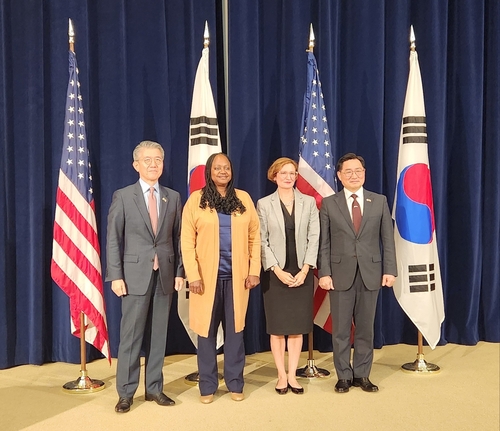- California Assembly OKs highest minimum wage in nation
- S. Korea unveils first graphic cigarette warnings
- US joins with South Korea, Japan in bid to deter North Korea
- LPGA golfer Chun In-gee finally back in action
- S. Korea won’t be top seed in final World Cup qualification round
- US men’s soccer misses 2nd straight Olympics
- US back on track in qualifying with 4-0 win over Guatemala
- High-intensity workout injuries spawn cottage industry
- CDC expands range of Zika mosquitoes into parts of Northeast
- Who knew? ‘The Walking Dead’ is helping families connect
S. Korea, U.S. not ruling out possibility of major N. Korean provocations near U.S. election
South Korea and the United States are not ruling out the possibility of North Korea conducting major provocations, like a nuclear test and an intercontinental ballistic missile (ICBM) launch, near the U.S. presidential election in November, Seoul officials said Wednesday.
First Vice Foreign Minister Kim Hong-kyun and Deputy Defense Minister for Policy Cho Chang-rae discussed the possibility and the allies’ responses to contingencies during this week’s session of the Extended Deterrence Strategy and Consultation Group (EDSCG), the allies’ key deterrence dialogue body, in Washington.
Representing the United States, Under Secretary of State for Arms Control and International Security Bonnie Jenkins and Acting Deputy Under Secretary of Defense for Policy Cara Abercrombie reiterated America’s “enduring” and “ironclad” security commitment to Seoul, and reiterated that any North Korean nuclear attack against the U.S. or its allies will result in the “end” of the North Korean regime.
“North Korea has not let up on advancing its nuclear and missile capabilities, and has continued provocative acts, such as GPS signal disruptions and the sending of trash-filled balloons,” Kim said during a press conference after the meeting.
“Under such circumstances, the two countries’ assessment is that the possibility of North Korea conducting significant provocations before or after the U.S. presidential election cannot be ruled out at all,” he added.

Cho touched on the possibility of Pyongyang carrying out what would be its seventh nuclear test or launching an ICBM at a standard angle rather than at a steep angle.
“As for the likelihood of its strategic provocations, North Korea might take the U.S. political schedule into consideration, but it might undertake provocations at a time when it can achieve its desired objective most effectively,” he said.
“I can say that we had discussions regarding the possibility of strategic provocations that could take place before the U.S. election,” he added.
At this week’s gathering, EDSCG participants had their first discussions based on scenarios of North Korean nuclear threats to explore effective diplomatic and defense measures to counter the threats, the Seoul officials said.
“In a way that is more advanced than the previous sessions, we held scenario-based discussions, where we explored various measures that can actually be applicable,” Cho said. “After all, we reconfirmed the two governments’ determination to deter North Korean nuclear threats.”
Jenkins reaffirmed the credibility of America’s nuclear deterrence, stressing that South Korea “can rely on us.”
“We take very seriously our extended deterrence,” she said, referring to the U.S. commitment to using the full range of its defense capabilities, including nuclear, to defend its ally.
“We have been doing everything we can, including this meeting, to show just how committed we are to that,” she added.
Her remarks were in response to a reporter’s question about persistent calls in South Korea for Seoul to consider nuclear options to deal with evolving North Korean nuclear and missile threats.
Abercrombie sought to quell those calls for Seoul’s consideration of nuclear options, stressing that the U.S. security commitments for allies in the Indo-Pacific are “absolutely steadfast.”
“Make no mistake. The United States remains firmly confident in our nuclear deterrent and the mix of capabilities that we possess today, and our nuclear posture,” she said.
The Pentagon official underscored that the U.S. will continue to field “flexible” nuclear forces suited to deter regional nuclear conflicts, including forward-deployed strategic bombers, dual-capability fighters and nuclear weapons.
Abercrombie also renewed a stern warning against a potential nuclear attack from Pyongyang.
“We remain committed to taking appropriate actions in response to destabilizing DPRK activities. The U.S. commitment to the ROK is enduring and ironclad,” she said. ROK and DPRK stand for the official names of South Korea and North Korea, the Republic of Korea and the Democratic People’s Republic of Korea, respectively.
“Any nuclear attack by the DPRK against the U.S. or its allies and partners is unacceptable and will result in the end of that regime,” she said.
The official also expressed confidence that the allies’ key deterrence dialogues, such as the EDSCG and the Nuclear Consultative Group, will continue regardless of presidential elections in both capitals.
“The alliance requires these mechanisms for our coordination, and we fully expect them to continue,” she said.
She reaffirmed the U.S. goal of achieving the “complete denuclearization” of the Korean Peninsula, while noting that Washington remains willing to engage in dialogue with the North “without preconditions.”
In a joint statement, the two sides said they shared assessments and concerns over the North’s “dangerous and irresponsible” behavior that violates the U.N. Security Council resolutions as well as its provocations along the DMZ.
They said their latest meeting carried forward the allies’ efforts to strengthen extended deterrence on the back of the Washington Declaration, while the U.S. reiterated its support for President Yoon Suk Yeol’s Audacious Initiative, meant to help the impoverished North improve its economy in return for denuclearization steps.
The next EDSCG meeting will take place next year.











